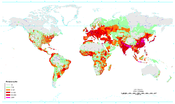As soon as humans began to form permanent settlements, and give up the process of hunting and gathering, agriculture was born. With agriculture came a new means of nutrition and ability to survive to a faltering species. Overpowering hunter-gatherers as dominant individuals, this new group altered the human race to what it is today. Though some tend to disagree with this statement, agriculture was a key and important step in benefiting human survival.
Agriculture wasn't a choice, as much as it was a critical adaptation to the population growth experienced in the eastern world. As hunter-gatherers succeeded in competing against other species, their population density inevitably increased. Land controlled could only support a single person per 10 square miles of area and demand was increasing. With a one hundred fold larger population density due to the adaptation of agriculture, you can see why it was so easily accepted without objection.
Imagine how the world would change if we suddenly reverted back to being hunter-gatherers. Think of all of the great thinkers and decision makers who would be lost. Accepting this would also include accepting the deaths of 99 for every single individual, thus wiping out many of the brilliant and famous of our time. 99% of world leaders would fail to exist; as a matter of fact 99% of any specific group would be wiped out; the results would be catastrophic. But it is agriculture which, by holding us together, sets us apart from previous adaptations of the human. For instance, we have the largest ever human population. We have discovered more then any other species; all as the result of agriculture.
Diamonds entire essay was based on 3 arguments of how agriculture had a negative impact on health, social structure, and the environment. Though each strong in structure,


